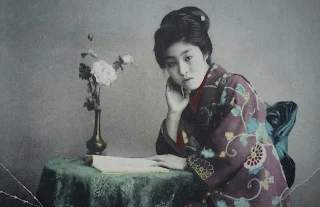Breaking the Brick Wall: Why Genealogists Struggle with Writing Family History
Poetry offers a way to break through this hesitation. Unlike long narratives, poetry allows for small, vivid snapshots of a person’s life, emotions, and legacy. It distills complex histories into digestible moments, making storytelling more accessible and engaging. You can pick one event out of an ancestor's life and magnify it to honor or to memorialize that individual.
How Poetry Makes Storytelling Easier
It Can Hlep You Focus on Key Moments – Instead of writing a detailed biography, poetry allows you to zoom in on a single event, emotion, or memory.
Poetry Can Remove the Pressure of Chronology – Traditional storytelling requires structure, but poetry can jump across time, blending past and present in a meaningful way.
A Poem Can Encourage Emotion and Reflection – Poetry is about feeling as much as fact. It allows genealogists to capture the emotional essence of an ancestor’s experience. For instance, in one line you can use an inanimate object to describe an uncle: "He was as solid and secure as a boulder."
Can Be Simple and Brief – A poem doesn’t have to be long or complex; even a few lines can powerfully convey a story. Start with a Bio Poem.
Poetic Forms That Work Well for Family Stories
Haiku – Captures a fleeting moment or a single image from an ancestor’s life.
Shadorma -- A six-line poem with syllable counts that originated from Spain.
Free Verse – Offers flexibility to tell a story without worrying about rhyme or strict structure.
Acrostic Poems – Use an ancestor’s name or a meaningful word to guide the poem’s structure.
Epistolary or Epistle Poems – Written as a letter to or from an ancestor.
Simple Poetry Techniques for Genealogists
Writing poetry about family history doesn’t have to be complicated. Break it down and make notes in the process. Walk away from your ideas and return to them later to see what gems you can develop into your poem.
Instead of attempting to summarize an entire life, focus on one small moment or a single memory. Perhaps your great-grandfather’s hands, calloused from years of farming, or the scent of your grandmother’s kitchen on Sunday mornings. These little details hold the heart of a story.
What did they see, hear, touch, or smell in that moment? Bring the senses into play to provide a realistic description of your ancestor and his surroundings. If you’re writing about an ancestor who worked in a textile mill, imagine the whirring of machines, the feel of coarse fabric, or the scent of oil in the air. Sensory details bring poetry to life.
Those senses allow you to ground your poem in reality, but you also can add historical context. If an ancestor lived through the Great Depression, mention the ration lines, the patched-up clothes, or the silent resilience of their eyes. These details connect personal experiences to larger historical events. Note that this also develops a class consciousness for your ancestor.
At this point, you can probably step into their shoes—how might they have felt? What were their hopes, fears, or daily struggles? A poem written in your ancestor’s voice and from his or her perspective can add depth and intimacy to this story.
Finally, you don’t need a long poem to create impact. Keep it short in the beginning. A few lines, a single stanza, or even a couplet can capture a powerful emotion or moment. Poetry is about essence, not length. This lack of length also can lend validation to your ability to write.
Step-by-Step Guide to Writing Your First Family History Poem
Choose an ancestor or event – Pick one moment that stands out.
Brainstorm details – Jot down key facts, emotions, and sensory details.
Decide on a poetic form – Keep it simple if you’re new to poetry.
Write a rough draft – Don’t worry about perfection; just get words on the page.
Refine and polish – Adjust words for rhythm and impact (don't even try to rhyme right now).
Share your poem – Read it aloud or share with family members.
Share with a teacher or poet friend – get their feedback!
Final Thoughts
Poetry is a powerful yet underused tool in genealogy. It makes family history approachable, creative, and emotionally resonant. By embracing poetry, genealogists can bring their research to life in a way that captures not just facts, but the heart and soul of their ancestors’ stories.
By the way, in your family searches, have you found a relative who wrote poetry? Let me know!

Comments
Post a Comment